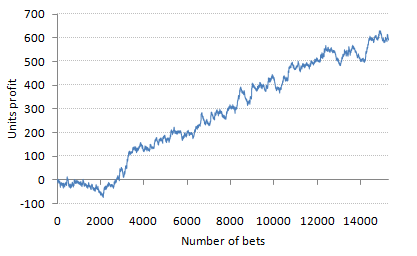
 |
|||||
|
Updated: 17/02/26
|
|||||




|
Betting Against the Market
In 2016 I published my book Squares & Sharps, Suckers & Sharks: Science, Psychology & Philosophy of Gambling in which I described a potentially profitable betting that adopted a so-called contrarian approach (betting against the market). Testing it retropsectively over the period 2005/06 to 2014/15 on European football league matches could have returned a profit of £60,000 from 15,000 level stakes of £100 each (although odds availabiliity, staking limits and other bookmaker restrictions would have had a significant influence on achieving this return). 
The betting method exploits a market inefficiency that arises as a result of bettors behaving in sub-optimal ways. By betting against that irrationality, the method has revealed an apparently consistent, if weak, profitbaility. The method is fully described in my new book (see below), page 114, Exploiting the Hot Hand Fallacy.
I have written a 10-page PDF describing the method. The material is essentially taken from my book. From December 2016 until November 2018 I had been charging a fee for this, but have now decided to offer it for free. Obviously I would rather you purchased my book since there is a whole lot of other information in there which I think you will find benefical to your betting, but the choice is yours. I have also published a slight variant of the method on Pinnacle. And I have now re-tested the method with a new set of data from 16 extra European and worldwide football leagues which replicate the original findings. Although the profitbability is small, it is available at Pinnacle closing prices. This is important, because Pinnacle, unlike other bookmakers, will not restrict you for using strategies that exhibit postive expected value. As for any betting method, Football-Data cannot guarantee that the methodology described will continue to allow the reader to make a profit by following the advice contained within. There is always the possibility that what you think you might have found is nothing but luck. Furthermore, where you may have found something real and profitable (and more than just luck), future exploitation of such a method can see its advantage disappear. Nor is this a recommendation to bet or gamble. Those who gamble do so at their own risk. Never risk what you cannot afford to lose. If you do, please gamble responsibly. |

|